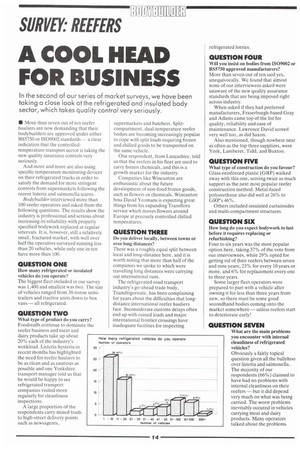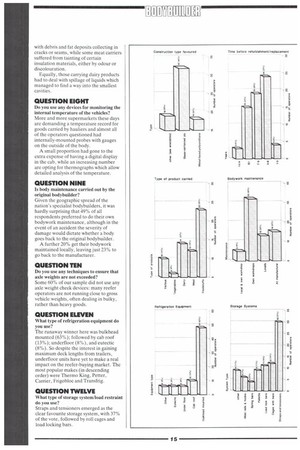A COOL HEAD FOR BUSINESS
Page 138

Page 139

If you've noticed an error in this article please click here to report it so we can fix it.
In the second of our series of market surveys, we have been taking a close look at the refrigerated and insulated body sector, which takes quality control very seriously.
• More than seven out of ten reefer hauliers are now demanding that their bodybuilders are approved under either BS5750 or IS09002 standards — a clear indication that the controlledtemperature transport sector is taking the new quality assurance controls very seriously.
And more and more are also using specific temperature monitoring devices on their refrigerated trucks in order to satisfy the demand for more stringent controls from supermarkets following the recent listeria and salmonella scares.
Bodybuilder interviewed more than 100 reefer operators and asked them the following questions. The results show the industry is professional and serious about increasing its reliability with properly specified bodywork replaced at regular intervals. It is, however, still a relatively small, fractured market, with well over half the operators surveyed running less than 20 vehicles, while only one in ten have more than 100.
QUESTION ONE
How many refrigerated or insulated vehicles do you operate?
The biggest fleet included in our survey was 1,400 and smallest was two. The size of vehicles ranged from 38-tonne semitrailers and tractive units down to box vans — all refrigerated.
QUESTION TWO
What type of product do you carry? Foodstuffs continue to dominate the reefer business and meat and dairy products take up about 20% each of the industry's workload. Listeria hysteria in recent months has highlighted the need for reefer hauliers to be as clean and as cautious as possible and one Yorkshire transport manager told us that he would be happy to see refrigerated transport companies visited more regularly for cleanliness inspections.
A large proportion of the respondents carry mixed loads to high-street delivery points such as newsagents, supermarkets and butchers. Splitcompartment. dual-temperature reefer bodies are becoming increasingly popular to cope with split loads requiring frozen and chilled goods to be transported on the same vehicle.
One respondent, from Lancashire, told us that the reefers in his fleet are used to carry frozen chemicals, and this is a growth market for the industry.
Companies like Wincanton are enthusiastic about the future development of non-food frozen goods, such as flowers or chemicals. Wincanton boss David Yeomans is expecting great things from his expanding Transflora service which moves flowers around Europe at precisely controlled chilled temperatures.
QUESTION THREE
Do you deliver locally, between towns or over long distances?
There was a roughly equal split between local and long-distance here, and it is worth noting that more than half of the companies we spoke to which were travelling long distances were carrying out international runs.
The refrigerated road transport industry's go-ahead trade body, Transfrigoroute, has been complaining for years about the difficulties that longdistance international reefer hauliers face. Inconsiderate customs delays often end up with ruined loads and major international frontier crossings have inadequate facilities for inspecting refrigerated lorries.
QUESTION FOUR
Will you insist on bodies from IS09002 or BS5750 approved manufacturers? More than seven out of ten said yes, unequivocally. We found that almost none of our interviewees asked were unaware of the new quality assurance standards that are being imposed right across industry.
When asked if they had preferred manufacturers, Fraserburgh-based Gray and Adams came top of the list for quality, reliability and ease of maintenance. Lawrence David scored very well too, as did Saxon.
Also mentioned, though nowhere near as often as the top three suppliers, were York, Lamberet, Tidd, and Buxton.
QUESTION FIVE
What type of construction do you favour? Glass-reinforced plastic (GRP) walked away with this one, scoring twice as much support as the next most popular reefer construction method. Metal-faced polyurethane also did well at 26% to GRP's 46'%.
Others included insulated curtainsides and multi-compartment structures.
QUESTION SIX
How long do you expect bodywork to last before it requires replacing or refurbishing?
Four to six years was the most popular option here, taking 37% of the vote from our interviewees, while 29% opted for getting rid of their reefers between seven and nine years; 23% for every 10 years or more, and 6% for replacement every one to three years.
Some larger fleet operators were prepared to part with a vehicle after owning it for less than three years from new, so there must be some good secondhand bodies coming onto the market somewhere — unless reefers start to deteriorate early!
QUESTION SEVEN
What are the main problems you encounter with internal cleanliness of refrigerated vehicles?
Obviously a fairly topical question given all the ballyhoo over listeria and salmonella. The majority of our respondents (66%) claimed to have had no problems with internal cleanliness on their reefers — but it did depend very much on what was being carried. The worst problems inevitably occured in vehicles carrying meat and dairy products. Many operators talked about the problems with debris and fat deposits collecting in cracks or seams, while some meat carriers suffered from tainting of certain insulation materials, either by odour or discolouration.
Equally, those carrying dairy products had to deal with spillage of liquids which managed to find a way into the smallest cavities.
QUESTION EIGHT
Do you use any devices for monitoring the internal temperature of the vehicles? More and more supermarkets these days are demanding a temperature record for goods carried by hauliers and almost all of the operators questioned had internally-mounted probes with gauges on the outside of the body.
A small proportion had gone to the extra expense of having a digital display in the cab, while an increasing number are opting for thermographs which allow detailed analysis of the temperature.
QUESTION NINE
Is body maintenance carried out by the original bodybuilder?
Given the geographic spread of the nation's specialist bodybuilders, it was hardly surprising that 49% of all respondents preferred to do their own bodywork maintenance, although in the event of an accident the severity of damage would dictate whether a body goes back to the original bodybuilder.
A further 20% get their bodywork maintained locally, leaving just 23% to go back to the manufacturer.
QUESTION TEN
Do you use any techniques to ensure that axle weights are not exceeded?
Some 60% of our sample did not use any axle weight check devices: many reefer operators are not running close to gross vehicle weights, often dealing in bulky, rather than heavy goods.
QUESTION ELEVEN
What type of refrigeration equipment do you use?
The runaway winner here was bulkhead mounted (63%); followed by cab roof (13%); underfloor (8%), and eutectic (8%). So despite the interest in gaining maximum deck lengths from trailers, underfloor units have yet to make a real impact on the reefer-buying market. The most popular makes (in descending order) were Thermo King, Petter, Carrier, Frigobloc and Transf rig.
QUESTION TWELVE
What type of storage system/load restraint do you use?
Straps and tensioners emerged as the clear favourite storage system, with 37% of the vote, followed by roll cages and load locking bars.
































































































































































































